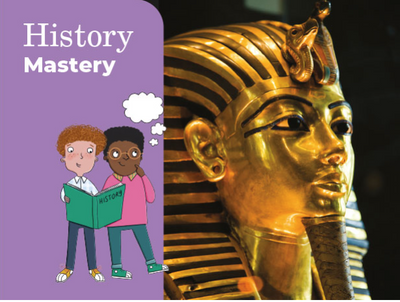History

Intent
At our school, we believe history is much more than learning about dates and events. It’s about helping children understand the world around them—how it came to be and how it continues to change. We follow the Ark History Mastery scheme, a carefully designed programme that helps pupils build knowledge and skills in a clear and meaningful way. This supports our school values of Ambition, Responsibility, and Excellence in every lesson.
Our aim is to ignite curiosity and develop a deep love of history in every pupil. The curriculum is designed so that pupils develop:
- A strong knowledge of people, places, and key events throughout history.
- An understanding of important historical concepts such as empire, monarchy, trade, and democracy.
- The ability to ask thoughtful questions, analyse evidence, and understand different viewpoints.
Through the History Mastery curriculum, we ensure that pupils don’t just learn facts—they also learn how to think like historians. This includes understanding cause and consequence, continuity and change, significance, and using evidence to build interpretations. This supports our value of Ambition by challenging pupils to engage with big ideas and think critically about the world around them.
Implementation
History is taught through well-sequenced units that build knowledge and skills over time
Our curriculum is built around four key pillars:
- Historical Enquiry – Each topic begins with an enquiry question, helping pupils explore important ideas and ask their own questions.
- Substantive Knowledge (the ‘what’) – This is the core content children learn: the people, places, and events from the past.
- Disciplinary Knowledge (the ‘how’) – These are the thinking skills historians use. Pupils learn to understand cause and effect, change over time, similarities and differences, significance, sources, and historical interpretations.
- Communication – Pupils practise expressing their ideas clearly, both verbally and in writing.
By combining these elements, we help children develop a strong, structured understanding of history—encouraging excellence in their learning.
Impact
By the end of Key Stage 2, our pupils will have:
- A secure and broad knowledge of history, including 19 key historical concepts explored in depth.
- A strong grasp of historical thinking, including understanding evidence, significance, similarity and difference, continuity and change, and interpretation.
- The confidence to communicate their ideas clearly, both verbally and in writing.
We believe this foundation gives pupils a clear historical perspective and prepares them to become thoughtful, informed citizens—ready to take on the world with excellence and understanding.
Our pupils leave primary school not only knowing about the past but also with the ability to ask great questions, evaluate information, and see how history connects to the lives we live today.








